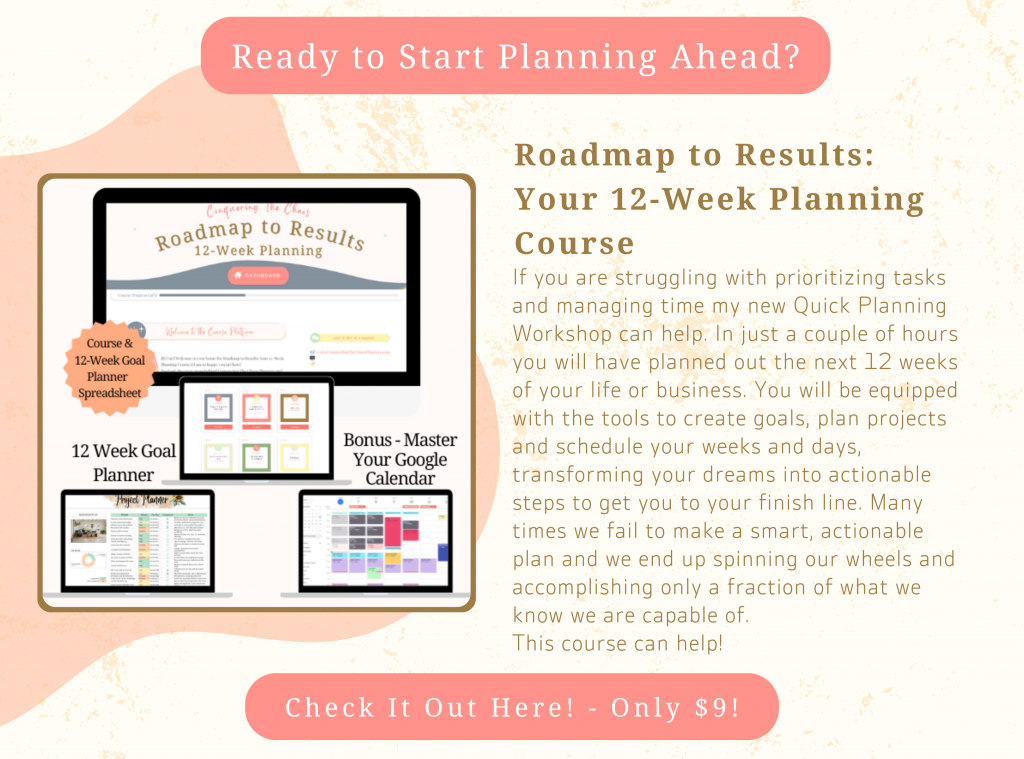
When you decide you want to give 12 week planning a try and you go through the effort of creating these beautiful goals and plans, the excitement and focus is incredibly motivating. Everything seems possible. But as you get deeper into the process, unexpected obstacles or moments of doubt can pop up, derailing your progress. At this point you just might be unsure of how to move forward.
Understanding Setbacks as Part of the 12 Week Planning Process
When working your 12-week goals, setbacks are inevitable. They might come in the form of unexpected roadblocks, internal frustrations, or simply things not going as planned. While discouraging in the moment, setbacks are a natural part of progress.
Instead of seeing setbacks as failures, view them as learning opportunities. They’re there to teach you something, adjust your approach, or help you find a new way to reach your goal. By reframing obstacles, you can actually use them to strengthen your path forward.
Common Types of Setbacks You Might Encounter
Understanding the types of setbacks you’re likely to face can help you prepare for and overcome them. Here are a few common ones:
1. Unexpected Obstacles
Life throws curveballs when you least expect them. It could be a family emergency, a work crisis, or even a health issue. These external factors are beyond your control and can make it difficult to stay on track with your goals.
2. Internal Struggles
Sometimes, the biggest setbacks are internal—lack of motivation, self-doubt, or fear of failure. These mental and emotional barriers can make it hard to keep moving forward.
3. Goal-Related Adjustments
Halfway through your 12-week planning, you may realize that something needs to change. Perhaps your timeline is too ambitious, or the goal no longer aligns with your priorities. Adjusting your goals isn’t a failure; it’s part of the process.
Practical Strategies for Overcoming Setbacks
Setbacks don’t have to derail your 12-week planning progress. If anything, they’re opportunities to rethink, refocus, and reenergize your approach. Here are a few strategies to help you overcome obstacles and get back on track:
1. Reflect and Reassess
When a setback hits, take a moment to reflect on the cause. Was it something beyond your control? Or did you need a different approach? Pausing to reassess helps you make adjustments and create a more realistic path forward.
How to do it:
Identify the root cause of the setback and decide if your timeline or goal needs to change. Then, create a new plan that better suits your current situation.
2. Break It Down Into Smaller Steps
Feeling overwhelmed can make your goal seem out of reach. Breaking it down into smaller, manageable tasks helps you regain momentum and feel more in control.
How to do it:
Focus on what you can do today. Set mini-goals for the next few days or weeks, and celebrate small wins. This helps rebuild confidence and keeps you moving forward, step by step.
3. Revisit Your “Why”
When motivation fades, it’s easy to lose focus. Reminding yourself of the reason behind your goal can help you stay motivated, even through tough times.
How to do it:
Write down your “why” and keep it visible. Whether it’s growing your business or improving your health, reconnecting with your purpose helps you push through setbacks and keep your eyes on the prize.
4. Celebrate Progress, Even Small Wins
Focusing too much on setbacks can make you forget how far you’ve already come. Celebrating small wins keeps you motivated and reminds you that you’re making progress.
How to do it:
Acknowledge every step forward. Whether it’s completing a task or making a breakthrough, celebrate your efforts. This boosts your morale and keeps you on track.
5. Use Setbacks as Learning Opportunities
Each setback teaches you something valuable. Instead of seeing them as failures, use them to improve your approach moving forward.
How to do it:
After each setback, reflect on what you learned. Did it highlight a gap in time management? Use this insight to adjust your strategy and better prepare for future challenges.
6. Lean on Your Support System
Sometimes, the best way to overcome a setback is to seek support from others. Whether it’s a friend, mentor, or accountability partner, talking things through can offer new perspectives and encouragement.
How to do it:
Share your challenges with someone who understands your goals. Having a support system keeps you motivated and helps you push through tough times.

Maintaining Momentum After a Setback
Once you’ve dealt with a setback, it’s essential to regain momentum and continue moving forward. Here’s how to do it:
1. Create a Recovery Plan
Review where you left off and outline the next steps. Breaking down remaining tasks into smaller, achievable actions helps you get back on track.
2. Reset Your Mindset
It’s easy to feel discouraged, but remember: setbacks are part of the process. Practice self-compassion and focus on the progress you’ve made.
3. Visualize Success
Take a few minutes each day to visualize reaching your goal. This keeps you focused on the bigger picture and reinforces your commitment.
4. Recommit to Your Routine
Getting back into a routine helps you regain momentum. Structure and consistency are key to staying productive after a setback.
Conclusion
Let’s be realists here for a moment: setbacks are always going to happen, they are a normal part of any goal-setting journey. The key isn’t to give up and scrap all your plans, but to roll with it and learn how to overcome them. If you are flexible and understanding that things will happen, I bet over time you will not even consider the problems that arise as “problems.” It will just be a part of your day and you will fix or pivot on your plans and continue kicking ass on your 12-week goals.

